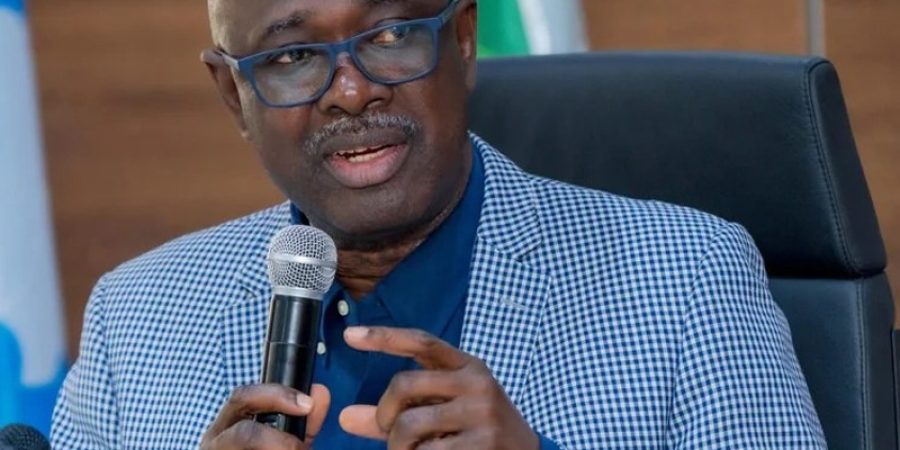The Minister of State for Petroleum Resources (Oil), Senator Heineken Lokpobiri, has stated that rather than tag Nigeria and other African nations, which account for only three per cent of carbon emissions, as culprits in the effort to end emissions, the continent should be viewed by the global north as victims.
This is just as the Nigerian National Petroleum Company Limited (NNPCL)has said that it is targeting 100 Compressed Natural Gas (CNG) stations by next year.
Speaking at this year’s ninth Organisation of Petroleum Exporting Countries (OPEC) International Seminar, which was held in Vienna, Austria, Lokpobiri maintained that Africa will continue to exploit its hydrocarbons to provide reliable energy sources for its many citizens without supply.
In a video, which was posted on OPEC’s X handle on Saturday, the minister pointed out that while the world was talking about moving to cleaner fuels, Nigeria and other African countries did not have anything to transition from, since the continent had not been able to end its energy poverty.
“Africa demands a lot more consideration from the rest of OPEC members and non-OPEC members as we drive towards ensuring that we resolve our energy poverty problems in Africa. For Nigeria, whatever we do benefits the entire West Africa sub-region. So, whatever we produce of crude oil and gas, it goes to service the entire West Africa sub-region. So, we’re making tremendous progress.
“I want to continue along that trajectory because we must ensure that we meet the energy demands of Africa, who suffer from acute energy poverty. And Nigeria is taking the lead in solving that problem. What will drive the future of energy in Africa is the gas revolution. Nigeria has officially taken gas as a transition fuel. Nigeria has more than 209 trillion cubic feet of gas reserves.
“And we’re making significant investments in gas. Africa is a victim when you talk about CO₂ (carbon dioxide) emissions. The entire continent contributes only about three per cent. But most of the effort made by climate advocates is more on Africa, telling African countries that are contributing only three per cent (to stop). We’re actually victims and not culprits,” he stated.
Lokpobiri emphasised that the world should exempt Africa from the so-called energy transition for now, explaining that at the moment, millions of people on the continent do not have access to a reliable power supply.
According to him, the easiest way for Nigeria and other African countries to have a sufficient supply is by taking advantage of their abundant oil and gas resources, noting that there’s no plan to abandon fossil fuels on the continent.
“What we’re saying is that energy transition means a different thing to Africa. First of all, before we talk about transition, we want to have energy. We don’t have energy. The easiest way we can have access to energy is through oil and gas.
“And we have no intention to abandon that because renewables have to be funded. Where do we get the money to fund the energy mix? We need the money from oil and gas to be able to finance other sources of energy. So, for the transition, as far as I’m concerned, we have nothing to transition from. We don’t have energy in the first place. And so Africa has to be treated differently by the global north,” Lokpobiri insisted.
Meanwhile, the Group Chief Executive Officer (GCEO) of NNPC Limited, Mr Bayo Ojulari, has said that the national oil company is targeting 100 CNG stations by next year.
This is coming amid increasing queues by motorists waiting to buy the fuel, with over 250 conversion centres nationwide, 100,000 kits acquired by the federal government, and about $525 million investment mobilised so far.
Speaking at the weekend at an Auto CNG Stakeholders Workshop in Abuja, Ojulari reassured Nigerians of NNPC’s commitment to working with all other arms of government to fulfil the vision of President Bola Tinubu for the scheme.
Tinubu’s CNG initiative is to convert existing petrol and diesel vehicles to run on CNG, which is both cheaper and environmentally friendlier. The government has begun rolling out CNG buses for public transportation, alongside setting up refuelling and conversion infrastructure across the country.
“In terms of downstream market accessibility, we’re also targeting 100 plus stations in the coming year with focus on major food transportation routes from north to south,” Ojulari added.
Ojulari stated that the NNPC will partner with licensed conversion centres to ensure there’s public confidence in the Presidential CNG Initiative (PCNGI), especially in terms of safety.
“It’s also very important that we continue to drive our customer-centric implementation, our focus on delivering measurable benefits, affordable pricing, reliable supply, focus on safe operation, and ensuring accessibility across the board,” he stated.
Emmanuel Addeh
Follow us on:



